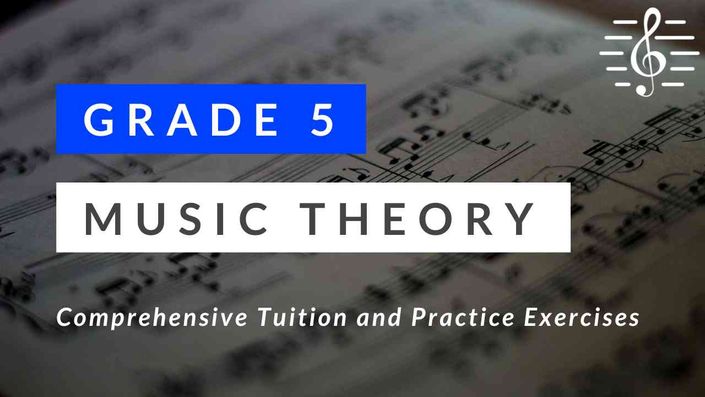
Grade 5 Music Theory
A complete, step by step and practical way to learn music theory and discover how music really works.
Enroll in Course
What You Will Learn
Become fluent in the fundamentals of music theory with the Grade 5 Music Theory course.
It's our belief that every musician needs to have the theory knowledge that supports their playing, singing, or composing skills. Designed to follow on directly from our Grade 4 Music Theory course, this course features clear explanations of music notation, many worked examples and practice exercises, definitions of important words and concepts, specimen questions and many helpful tips for students. As well as being suitable for candidates preparing for ABRSM music theory exams, this course also provides an excellent resource for anyone wishing to develop general music literacy skills. During the Grade 5 Music Theory course we'll cover...
- Irregular Time Signatures and Divisions - How does 5/4 work? How do you fit seven notes into a beat? How do you group notes in irregular time signatures?
- Keys, Scales, Enharmonics and Tenor Clef - What is an enharmonic and when do you use it? How do you read tenor clef? Which key has six flats?
- Chords, Cadences and Intervals - How do you form a cadence? Where are cadences used? What is a compound interval?
- Transposition - How do you transpose music into a different key? How do you transpose down a minor third? Which instruments need transposed scores?
- Voices in Score and Composing Melodies - What is the difference between short and open score? How do you convert music from one to the other? How do you write a good melody?
I went straight in at grade 5 with the help of your course and just missed a distinction. Recommendation from a satisfied customer.
- Derek

Who Is This Course For?
All keen music students, performers and examination candidates.
Can you think of any other human endeavour where not knowing what you're doing is considered a positive? Understanding music theory is of great importance to all musicians. Music is a universal language and knowing how it all works is the key to improving. Our music theory courses cover all the essential elements of music from the ground up and are ideal for students preparing for examinations, as well as an excellent resource for anyone learning to read music. This course follows on from our Grade 4 Music Theory course.
Do any of these sound familiar?
"I'm studying music and need a good level of theory knowledge..." "I want to learn how to read music fluently..." "When I see music written down there are too many things I don’t understand…" "I need to pass theory exams in order to access the higher practical grades..." "I want to learn how music theory works in a way that is also related to sound…"
↓
Dear Gareth, I recently took the first, trial ABRSM online grade 5 theory course as an older student - raking up all that remained in my brain of taking O-level music at Sheffield High School in about 1975 - and was finding revising quite a struggle until I discovered your courses. You made it all so straightforward with your calm approach, and I’m delighted to say I got a Distinction!
- Sarah

By the end of the Grade 5 Music Theory course you'll be able to…

Work in all the major and minor keys and understand their scales

Figure out complicated harmonic and melodic intervals

Easily transpose music into different keys

Compose great melodies complete with chord schemes, cadences, phrasing and dynamic detail

Read notes in tenor clef, understand ornaments and enharmonic conversion

Play music with irregular time signatures and irregular time divisions of tuplet rhythms
I have recently purchased your videos on Music theory as I am currently doing my grade 5 theory. I really like the way you explain things in simple terms. The videos are brilliant.
- Timothy

Course Information
What's Included with the Grade 5 Music Theory Course?
Professional Teaching
You'll receive expert tuition, making it easy to follow, digest and internalise all the important concepts of music theory.
Practice Exercises
The course contains a complete set of sample questions for you to test your knowledge after working through the teaching material.
Ask Questions
Below each video you are able to post comments and ask questions should you have any in regards to the course topics covered.
Easy to Follow Structure
The course is divided into multiple stages, breaking down each part separately before putting it all together.
Complete at Your Own Pace
You can easily fit the course around your regular commitments, completing it at your own pace and in your own time.
Anywhere Access
Your course never expires. Learn when and where you choose! Computer or mobile. Just get comfortable and dive in!
↓
Your Instructor

Hi, I’m Gareth and I'm passionate about developing ‘the all round musician’.
Over 35 years of music examining with ABRSM, work with the BBC on Radio and TV, experience on the international concert platform, as a published composer and arranger, have brought rich resources to the 40 years of teaching in which I've engaged.
Scholarships at The Royal College of Music, Oxford University and St. Paul’s Cathedral gave me fantastic opportunities to learn from the best musicians, scholars and teachers. Working as Director of Music at Queen Elizabeth Grammar School then provided a wonderful opportunity to develop my teaching skills.
Teaching individuals and groups of all ages, and at all stages of development have refined a teaching approach that I hope is fun and engaging, and focused on explaining things clearly and logically. And that is what these courses are all about - understanding the basic principles with clarity, then going deeper, applying them to your musical life and liberating yourself as a musician.
It’s a rich and amazing journey, and I can’t wait for you to join me today!
Course Curriculum
-
StartLesson 1 - The Tenor Clef (10:06)
-
StartLesson 2 - Keys for Grade 5 (18:10)
-
StartLesson 3 - Enharmonic Conversion (7:26)
-
StartLesson 4 - Intervals (13:46)
-
StartLesson 5 - Transposition (47:49)
-
StartLesson 6 - Voices in Score (15:01)
-
StartLesson 7 - Irregular Time Signatures (13:08)
-
StartLesson 8 - Irregular Time Divisions (6:07)
-
StartLesson 9 - Chords (24:34)
-
StartLesson 10 - Cadences (26:14)
-
PreviewLesson 11 - Composing a Melody (25:16)
-
StartLesson 12 - Ornaments (12:09)
-
PreviewLesson 13 - Composing a Melody (Example 2) (36:00)
Frequently Asked Questions
A Letter from Gareth Green
MA (Oxon), MA (Leeds), FRCO(CHM), FLCM, ARCM
Many students of music want or need to pass music theory exams and this course is very focused on enabling you to achieve that.
At the same time, theory is about much more than passing exams. Have you ever wondered what it would be like to get inside the mind of a composer? Think of a piece that you’re working on or listening to at the moment. What inspired the composer to write it? When did the composer live and what are the features of musical style at that time? Then what did the composer need to think about in order to compose the piece?
Theory explores the ingredients that bring music to life and, contrary to the idea held by some that theory kills creativity, it’s theory that enables musicians to make sense of their musical ideas.
If we go back in time music was in the world well before anyone dreamt up music theory. So do we really need theory? After all, we can all enjoy music without needing to understand the nuts and bolts. Some musicians have the ability to perform and improvise without completely understanding the theory behind what they are doing. I can manage a few words and phrases in Italian but because I understand more grammar and vocabulary in French I get on much more successfully in French than I do in Italian. Because I understand even more grammar and vocabulary in my native tongue I get on considerably better in English than I do in French. The more we understand of a language, the more fluent we become, and music is often described as a language.
The interesting thing is that music theory was taken very seriously as far back as the time of the Ancient Greeks, who were keen to explain how music worked and to establish why certain approaches were more successful than others. Ever since, theory has continuously evolved to keep pace with explaining musical development.
Having taught music for over 40 years, my experience is that the more students understand theory, the more they understand and appreciate the music they perform, and the more excited, creative and engaged they become.
Don’t learn theory for the sake of learning theory. Engage with music as a listener, a performer, and/ or as a composer then grasp the theory that will equip you to reach your full potential as a musician. That’s what makes music theory so exciting! Enjoy!
— Gareth Green, Music Matters




